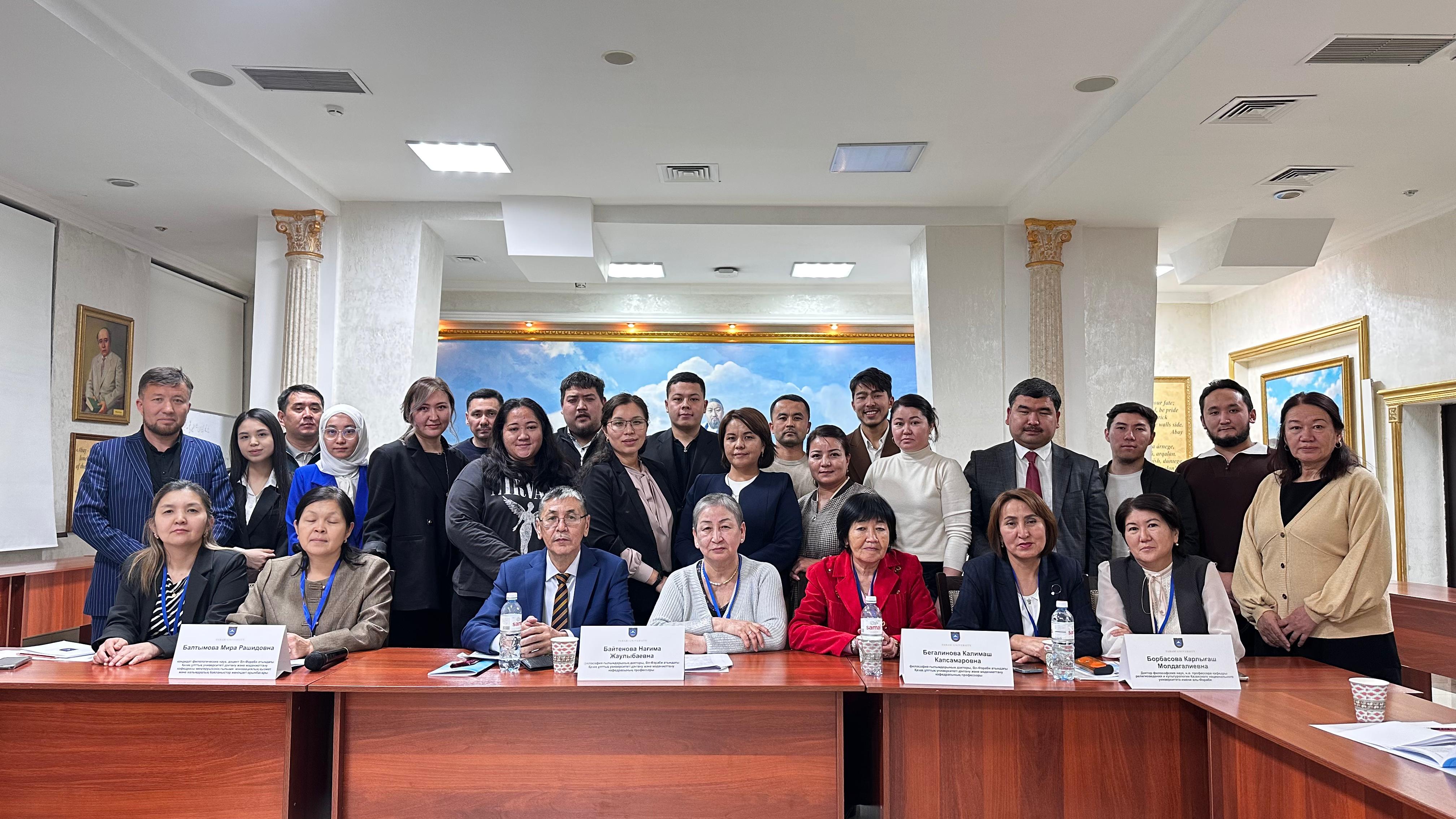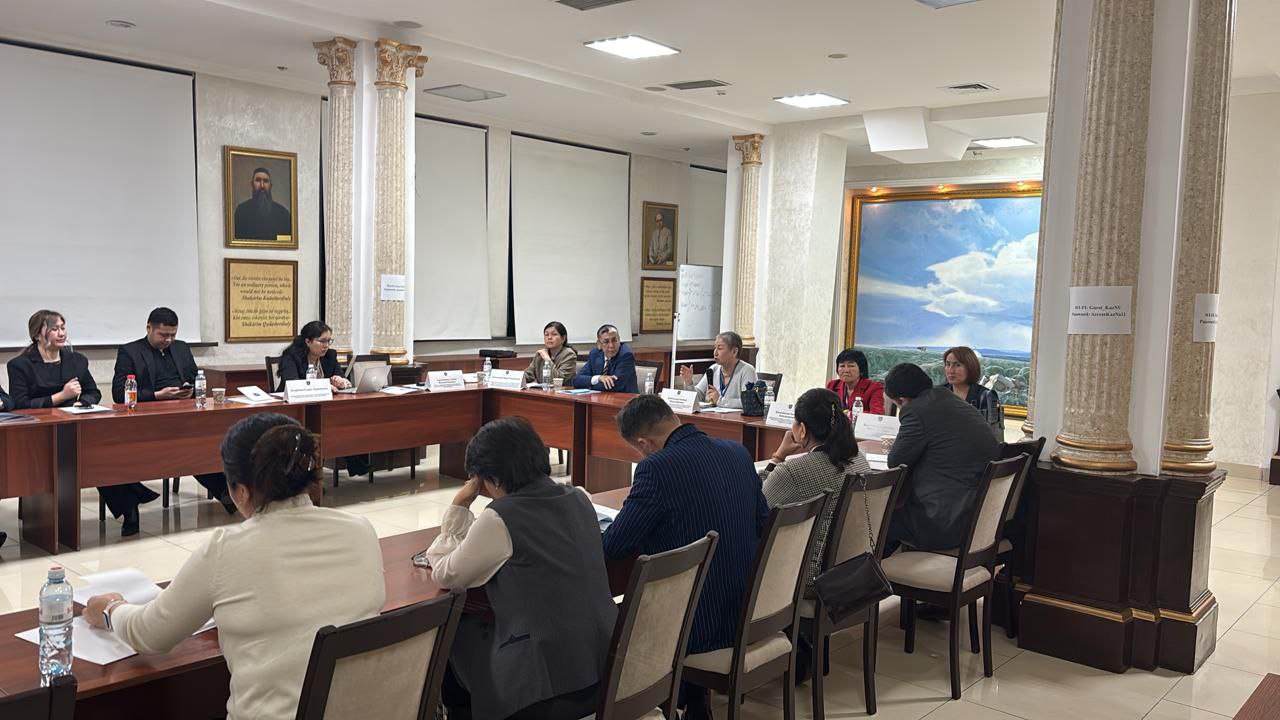- Main
- News
- Al-Farabi Kazakh National University discussed topical issues of religious studies in Kazakhstan at the Republican level
Al-Farabi Kazakh National University discussed topical issues of religious studies in Kazakhstan at the Republican level

On November 28, the Al-Farabi Scientific Library hosted the Republican scientific and practical conference "Actual problems of religious studies in Kazakhstan", dedicated to the 90th anniversary of the Al-Farabi Kazakh national University.
The grand opening of the plenary session was opened by the dean of the Faculty of philosophy and political science Meirbayev Bekzhan Berikbaevich, who made an opening speech on this topic and wished good luck to the conference participants. The moderator of the meeting was Professor, Doctor of philosophy Baitenova N. zh.
The opening speech was given by K. K. Begalinova, professor of Al-Farabi Kazakh National University, doctor of philosophy, Kalimash Kapsamarovna revealed the importance of Islamic and Islamic Studies in Kazakhstan in a historical perspective. He pointed out that Islamic education in the country can be obtained not only in religious educational institutions, but also in secular educational institutions. «...If you think about a year, plant a crop. If you think about your ten years, plant a tree. If you think about your hundred years, raise a generation, pay attention to education," he argued with arguments about the importance of Islamic and religious education.
In this regard, the report of the chief researcher of the Institute of Philosophy, Political Science and religious studies, corresponding member of the NAS RK, doctor of philosophy, professor Seitakhmetova N. L. presented the problems of today's Islamic Studies in an educational and epistemological context and revealed the previous topic. "I don't know," he said. "Was Islamic studies formed in Kazakhstan as a science?"and stopped at the importance of the Islamic Studies Program. At the same time, he put forward proposals not to drop the scientific, academic degree of Islamic studies, arguing that Islamic studies should be based on a rational understanding, not focusing only on apologetic, axiological interpretation. If Islamic studies are of practical importance, it is necessary to pay attention to the Prevention of interethnic and interfaith conflicts.
Among the speakers, Nagima Zhaulybayevna noted that Islamic studies have received an official civil degree, are developing rapidly, and gave a turn to reports on religious education.
Head of the Center for Religious Studies and expertise, doctor of philosophy, professor Kurmanalieva Ainur Tumanenovna conducted a comparative analysis of the systems of religious education in Kazakhstan and Malaysia, made a meaningful report, spoke about the strengthening of ties with the University of Malaya, its professors and reported on its contribution to the religious education of the country.
Then Professor, Doctor of philosophy Kenzhetai dosai of the International Kazakh-Turkish university named after Khoja Ahmed Yasawi defended a report on the topic: "religious groups in Kazakh society and their conclusions". During the speech, he focused on the periods of Sufism, Tariqat and the heritage of Iasaui. As a result, he stressed the importance of knowing our history for the stability of the religious situation.
Zatov Kairat Aitbekovich, professor of the Department of religious studies of the Egyptian University of Islamic culture Nur-Mubarak, doctor of philosophy, spoke about the trends and prospects of modern religious studies. He defined the history of religion and philosophy of religion, outlined the problems and difficulties of cognitive religious studies. In conclusion, the professor encouraged religious scholars to focus on theoretical and methodological problems of religious studies.
Associate professor of the Eurasian National University named after L. N. Gumilyov, candidate of philosophical Sciences Tyshkhan Kenshilik made a substantive report on the topic "religious fundamentalist concepts and problems of religious identity", which combined theory and practice on the challenges faced by specialists in the field of religion today, gave an example of what is happening in society.
Professor of Al-Farabi Kazakh National University, doctor of philosophy Borbasova Karlygash Moldagalievna made a report on the topic" integrative and disintegrative functions of religion through the prism of religious theories " and showed the results of her research. Weber analyzed the views of scientists such as Durkheim, former and modern, Martin Muller King. In conclusion, in principle, religion has many integrative values, only a few disintegrative functions, so it is necessary for religious scholars to draw objective conclusions during the study.
Associate professor of the Department of philosophy and theory of culture of Karaganda University named after academician E. A. Buketov, PhD Tutinova Nurgul Erkanatovna demonstrated with examples the influence of the religious factor on the socio-cultural situation in Kazakhstan.
Duisenbayeva Albina Kurakbaevna, acting associate professor of the Department of religious studies of the Egyptian University of Islamic culture Nur-Mubarak, PhD, briefly and concisely presented the factors contributing to religious radicalization and participation of women in extremist groups.
Continuing the topic of religious education, the head of the Department of religious studies of the International Kazakh-Turkish university named after Khoja Ahmed Yasawi, PhD Kamalova Faireide Bolatovna, proposed to list the places of religious and religious education in the country and establish their relationship. Thus, he expressed a weighty conclusion that it is possible to increase tolerance among applicants and future specialists in the field of religion.
The final speech was made by Professor Baitenova Nagima Zhaulybayevna, who announced the resolution of the conference. Earlier, he summed up the scientific work done in the field of religious studies and put forward proposals for further steps into the future. To do this, it is necessary to conduct science and education in parallel. Although religious studies were formed earlier in relation to Islamic studies, it is still considered a new branch, which has unresolved problems. "I don't know," he said. Now special attention should be paid to individual areas of religious studies, for example, cognitive religious studies, comparative religious studies, confessional religious studies, textbooks and monographs should be written in large numbers. The need to draw a clear line between theoretical and practical religious studies, to formulate individual scientific methods and techniques related to religious studies, motivated the coexistence of secularism and religiosity, as they lived in a postsecular society.
In addition, it was noted that traditional religions are beginning to lose their level of passion, new religiosity, quasi – religiosity, religious conversion and proseletism, problems of combining religious and religious knowledge are the most pressing problems facing today's religious scholars and Islamic scholars.
In general, the Republican conference was attended by doctors, professors, religious experts of the Kazakh National University named after Al-Farabi, the International Kazakh-Turkish university named after Khoja Ahmed Yasawi, the Egyptian University of Islamic culture Nur-Mubarak, the Eurasian National University named after L. N. Gumilyov, the Karaganda University named after academician E. A. Buketov. As a result, issues and their solutions in the field of Islamic Studies and religious studies were discussed and a resolution of the conference was issued.

Department of religious and cultural studies
Candidate of philological science, Associate Professor Baltymova M.R.,
Acting Associate Professor, PhD Tungatova U.A.,
doctoral student Yeleussyzbayeva N.M.
